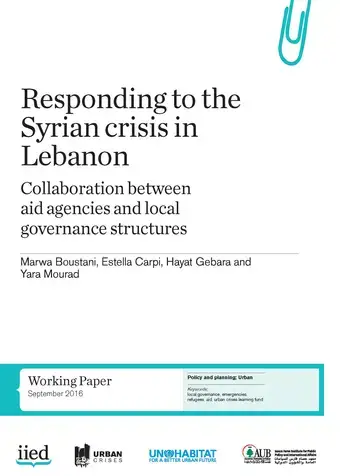UN-Habitat hosts ‘Urban Crisis Response’ conference in Lebanon
Beirut, 2 November 2016—UN-Habitat hosted a conference on “Urban Crisis Response” to examine and discuss the plethora of challenges facing Lebanon’s urban population. Under the patronage of the Ministry of Social Affairs, and on the occasion of the World Cities Day 2016, the Conference focused on building a platform for exchange between various stakeholders engaged in urban response.
Regional Technical Offices Improving Municipal Planning & Enhancing Local Governance
 The Regional Training Officers is a unit performing under the mandate of the Union of Municipalities (UoM), and comprises motivated local experts and technical persons. It aims at mobilizing public and civil local actors to collectively address local needs based on available resources. The RTO is a tool that aims to strengthen local governance, enhance service delivery, and mainstream planned interventions.
The Regional Training Officers is a unit performing under the mandate of the Union of Municipalities (UoM), and comprises motivated local experts and technical persons. It aims at mobilizing public and civil local actors to collectively address local needs based on available resources. The RTO is a tool that aims to strengthen local governance, enhance service delivery, and mainstream planned interventions.
Norwegian Prime Minister visits Syrian Refugee in Lebanon
 Beirut 13 November 2015-- The Prime Minister of Norway, Erna Solberg, last Saturday made a sudden and brief visit to the Nabaa neighborhood, which falls within the Municipality of Bourj Hammoud in order to take a closer look at the living conditions of Syrian refugees and how this impacts Lebanese host communities especially the most vulnerable and marginali
Beirut 13 November 2015-- The Prime Minister of Norway, Erna Solberg, last Saturday made a sudden and brief visit to the Nabaa neighborhood, which falls within the Municipality of Bourj Hammoud in order to take a closer look at the living conditions of Syrian refugees and how this impacts Lebanese host communities especially the most vulnerable and marginali
Lebanon Updates Newsletter
 Since 2007, UN-Habitat has been adopting a community based approach through establishing Regional Technical Offices (RTOs) at the level of Unions of Municipalities (UoMs).
Since 2007, UN-Habitat has been adopting a community based approach through establishing Regional Technical Offices (RTOs) at the level of Unions of Municipalities (UoMs).
The RTO is a unit performing under the mandate of the Union of Municipalities, and comprises motivated local experts and technical persons. The unit aims at mobilizing public and civil local actors to collectively address local needs based on available resources.

 This paper explores on how one of the most vulnerable populations in Beirut, Syrian refugees,1 realise their security interests in the face of both the threat and actuality of violence, within plural provision arrangements.
This paper explores on how one of the most vulnerable populations in Beirut, Syrian refugees,1 realise their security interests in the face of both the threat and actuality of violence, within plural provision arrangements. Lebanon’s refugee crisis has highlighted the need for much closer coordination among the various organisations and local authorities involved in the response.
Lebanon’s refugee crisis has highlighted the need for much closer coordination among the various organisations and local authorities involved in the response.
